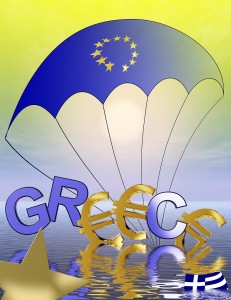09/19/2011 by Dr. Harald Malmgren
The following is a summary of a presentation being given by Dr. Malmgren to the CEBM Teleconference 20 September 2011
In 2007 and 2008 the US was at the epicenter of global financial shocks, although the first big bank to require rescue was BNP Paribas, on August 9, 2007. One consequence of the financial shocks was the longest and deepest global recession since the 1930’s, with the most severe effects following the collapse of Lehman in September, 2008.

In September, 2011, the world again is facing another round of financial shocks. The epicenter this time will be in the Eurozone. Ironically, BNP Paribas is again on the edge of failure, along with Societe Generale and Credit Agricole.
In September, world markets are expecting continuation of IMF/ECB/EU (“troika”) bailouts of Greece. The IMF plays the lead role in discussions with Greece. Internally, IMF staff now believe Greek default is certain. The only question for them is the timing of the default.
Christine Lagarde, the IMF boss, has informed Greeks that IMF will not provide its share of next payment to Greece at this time, as Greece has not met the IMF deficit targets previously agreed. Further troika talks with Greece remain suspended.
Informally, European governments also notified Greece that additional severe cuts in spending and in public employment will be necessary before any additional aid is considered. Prime Minister Pandreou cancelled his trip to the US and is now in emergency discussions with all political parties in Greece. Members of his own Pasok party believe voters will not accept IMF demands and new elections must be called.
In spite of Greek political turmoil, German Finance Minister Schauble has just stated that Greece has a choice: To implement troika demands, or leave the Euro. Schauble’s position is not the same as that of Chancellor Merkel, but the German leadership is beginning to split over Greece and other potential bailouts.
In Germany, Merkel’s political power has been seriously weakened by 6 consecutive defeats of her political party in regional German elections. Schauble now has de facto more power than Merkel. The Bundesbank intends to oppose ECB bond buying of Italian sovereign debt, opening a confrontation between Germany and the ECB. The German parliament may approve the €440 billion level for the EFSF, and some additional flexibility, but will not agree to increase beyond this size. The parliament will also not agree to issuance of Eurobonds. Behind the hardening of German government position on Greece is that a majority of German voters now oppose any further bailouts of Greece or any other Euro member governments.
At the same time, several Eurozone banks have suffered dramatic falls in their stock valuations. Eurozone banks have stopped trusting each other and short-term funding market has dried up. ECB has now replaced the normal short-term funding markets as banks turn to the ECB for liquidity.
Because of collapsing stock prices, short-term funding freeze, and warnings of investor and depositor loss of confidence, some banks and governments in Europe are engaged in emergency planning (French government is in crisis talks with its 3 biggest banks). Some Eurozone and Swiss banks are as big or bigger than the GDP of their countries, raising the dark shadow of an “Iceland effect.”
US Fed and Treasury are quietly warning that US may not be able to assist as generously as it did in 2008, as Congressional pressure is rising for Fed and Treasury to take care of US and avoid more funding of foreign interests.
Global economy is in slowdown. The UK is in stagnation. Eurozone growth is likely to turn negative, and even Germany looks likely to approach zero growth. US economy is temporarily in near-zero growth mode. In most countries, governments and central banks have few tools left to offset weakening economies. Weak world trade growth and global economic slowdown together mean weak world demand for trade.
Questions arise throughout the world whether China might rescue the Eurozone. The ECB does not have unlimited capability; an expanded EFSF unlikely; major banks need recapitalization but it is hard to raise new capital. The combined need of Euro sovereign borrowers and private banks in Eurozone is measured in €Trillions, not €Billions. Is China ready or willing to commit €Trillions?
Recent high correlation of equities and commodities is not sustainable. Repricing of risk will occur, with shift to assets that are more “liquid” and embody greater “quality”, between both stocks and fixed income securities. Bigger market volatility is likely, amplified by computerized (HFT) trading. Euro/dollar balance likely to shift in favor of dollar as flight to liquidity intensifies.
The cooperation among big banks will be limited by distrust, regulation, capital requirements and weak profitability. Governments and central banks have limited tools to deal with the next phase of the crisis. New sources of capital will be sought (family offices, newer banks, private equity, sovereign wealth funds, etc.). And a shift of financial market weight towards Asia and away from Europe will gradually take place.
It will increasingly be a time for increased caution and shift to long-term portfolio strategies that can endure near-term financial market storms for global investors.

